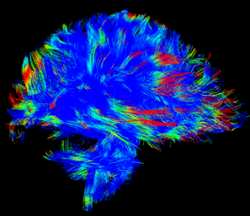Researchers awarded $750,000 from inaugural New Frontiers in Research Fund



Biomedical Engineering faculty members Baron Corey, Emma Duerden, and Haojie Mao have been awarded $250,000 each over two years from the first New Frontiers in Research Fund (NFRF), representing three of the five awarded Western researchers.
The NFRF, designed by the Canada Research Coordinating Committee, is to create opportunities for early career researchers with highly innovative projects. The fund supports high-risk and high-reward interdisciplinary projects, helping Canadian researchers make great discoveries in their fields.
"Our government's vision is for our researchers to take risks and be innovative," says the Honourable Kirsty Duncan, minister of science and sport. "This new fund will help us achieve that vision."
Their application titles were: Baron – Microstructural imaging of concussion; Duerden – Neuroimaging biomarkers for prenatal detection of preterm birth; and Mao – Multi-disciplinary biomechanical and mathematical modelling of the brain to understand mild traumatic brain injury/concussion.
"Concussion results in a complex cascade of tissue damage that is still not well understood," says Baron. "The funding will enable us to develop a new paradigm for biomarkers of concussion based on microstructural modelling that is informed by advanced MRI. This will give us unprecedented insight into the cascade of cellular changes that occur from concussion.”
Baron is hopeful that the NFRF will help set the stage for translation of his research to clinical trials. “This work will define a new platform for the future investigation of how different genetic and pharmacological interventions affect cellular microstructure and recovery of cognitive function after concussion,” he says.
Duerden's research is concerned with conditions that develop very early in life, from premature birth. "We'll take images of the brain using MRI before a baby is born to identify risk factors for premature birth, " explains Duerden. "We'll also follow the babies until the age of one to examine how premature birth impacts brain development, using MRI and functional near-infrared spectroscopy (fNIRS), as well as their motor and cognitive abilities."

Mao and his team are also seeking a better understanding of concussion. "Concussion starts with a simple blow to the head but ends up with very complex symptoms," Mao says. "As local neuronal operations and integration of these local functions underlie brain function, a critical question for concussion emerges – how a blow to the head disrupts intrinsic, and extrinsic, connectivity networks in the brain."
The goal of his team's research is to develop and apply a group of tools that can help understand network-based injury mechanisms of concussion. "Research from this proposal can eventually help design novel protection gear to reduce the risk of concussion, including helmets," Mao says. "In the long term, the proposed research will be intrinsically linked with neuroimaging for diagnosing concussions and can be extended to re-engineer brain networks for better recovery from brain trauma."
All of us can relate directly or know someone who is affected by the conditions Baron, Duerden, and Mao are researching. "Concussion is a common condition that can have a serious impact on health, cognition, and quality of life," says Baron.
"There are 4,000 premature babies born every year. These children are at high risk for having difficulties at school, as well as developing ADHD and autism spectrum disorder,” says Duerden. “Overall, we want to advance medical imaging research on the fetal brain to ensure children who are born prematurely can reach their full potential.”
Learn more
- Baron's research – cfmm.robarts.ca/people
- Duerden's research – developingbrain.ca
- Mao's research – eng.uwo.ca/media/news/2017/mao-bio
- New Frontiers in Research Fund






